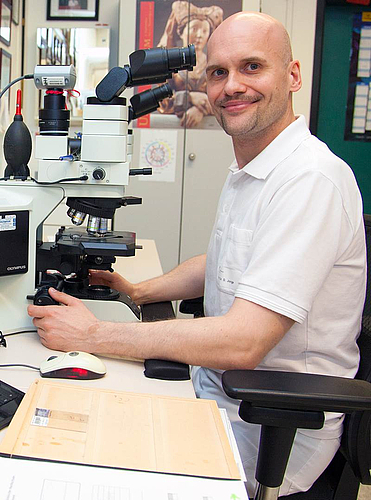High honor for researcher of the Hannover Medical School (MHH): Professor Dr. Danny Jonigk from the Institute of Pathology has received the highly coveted science grant "Consolidator Grant from the European Research Council (ERC)" from the European Union (EU) - and thus a donation of around two million euros. In addition, four other MHH teams will receive more than 1.5 million euros for their research in new European networks.
Professor Danny Jonigk's project entitled, "Hanover experimental lung research project (XHaLe)", plans to cure previously incurable lung diseases. Currently, around half a million people in Europe die from lung diseases that are not cancer-related - such as chronic obstructive pulmonary disease (COPD), pulmonary fibrosis, pneumonia or severe asthma. To date, some medications can slow this disease down, but not cure it. The last resort for those affected is a lung transplantion. Professor Jonigk wants to cure these diseases. In the next five years, he and his team will examine 700 sick lungs taken from patients by transplants. The MHH is uniquely suited to this project, as at MHH the most lungs are transplanted across Europe: in 2017, there were around 120.
Professor Jonigk uses these lungs to study, in particular, the mechanism of so-called fibroization, which is at the center of the disease. This is the abnormal proliferation of connective tissue in the lungs that causes the lung to stop functioning properly. Macrophages play a key role in this process. These cells should be changed with the help of the so-called gene scissors so that they can halt or reverse the course of the disease. In the long term, these macrophages should be administered to patients by infusion or inhalation for therapeutic purposes.
However, Professor Jonigk and his team are also concentrating on all the inflammatory cells that are found in the explanted lungs. They activate the so-called myofibroblasts - cells that produce the connective tissue - and could also be targets for drugs. The scientist works very closely with working groups of the MHH Clinic for Cardiac, Thoracic, Transplantation and Vascular Surgery (HTTG), the MHH Clinic for Pulmonology and the MHH Institute for Diagnostic and Interventional Radiology.
At the MHH there is a worldwide unique infrastructure that Professor Jonigk and his partners have built up. It allows the extracted lungs to be examined very freshly: After a diseased lung has been taken from a patient during transplantation, it is sent directly to the MHH Institute of Pathology at any time day or night to join Professor Jonigk's lung research group. It takes at most 30 minutes between removal of the organ and the beginning of the first examinations. Then the Dr. Peter Braubach coordinated tissue bank the organ for the researchers so that they can perform their scientific investigations. They are available 24 hours a day, seven days a week, using all the diagnostic possibilities of modern pathology. Twenty-five local, national and international partners, especially from the research network BREATH - the Hanoverian location of the German Center for Lung Research (DZL) - have been using this offer so far. Over the past four years, the lung research group has already processed more than 500 lung explants.
Text: MHH / Bandel
Picture: MHH / Kaiser

Prof. Dr. Danny Jonigk, Platform Leader Pathology